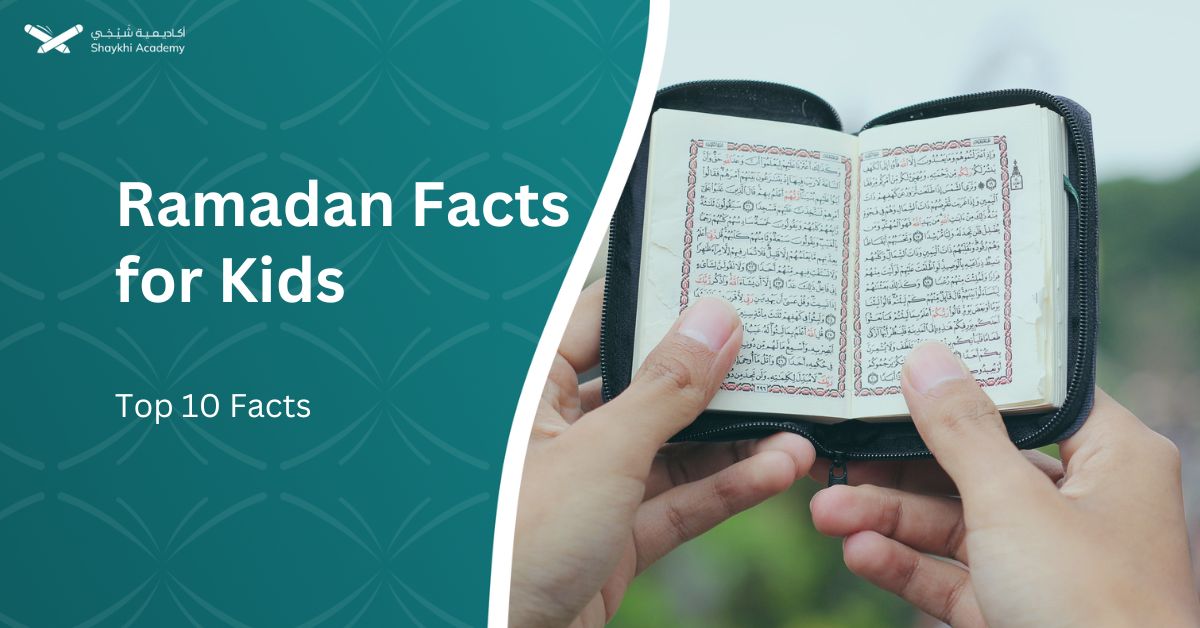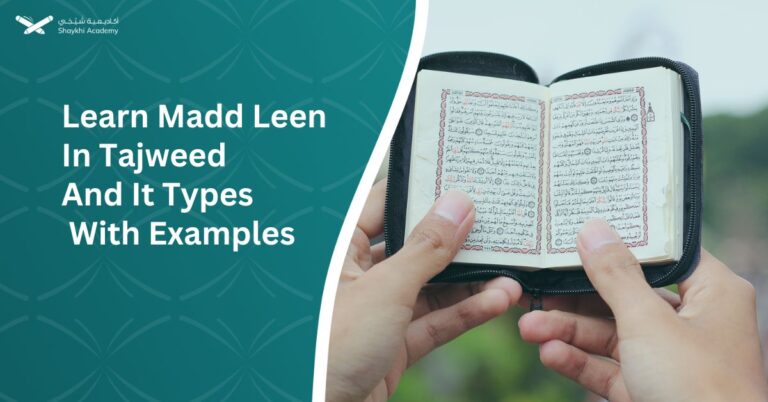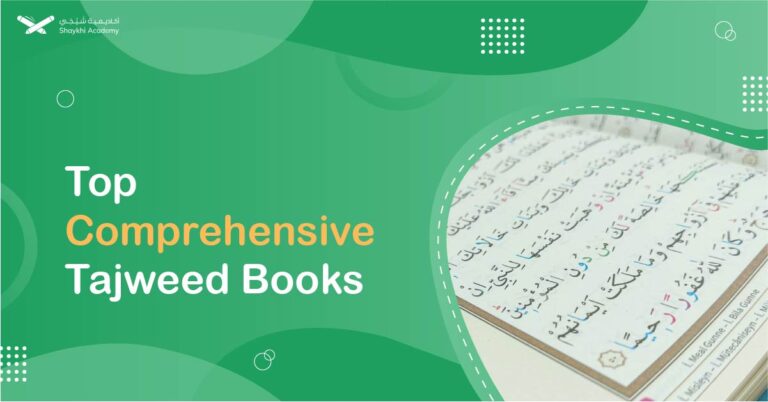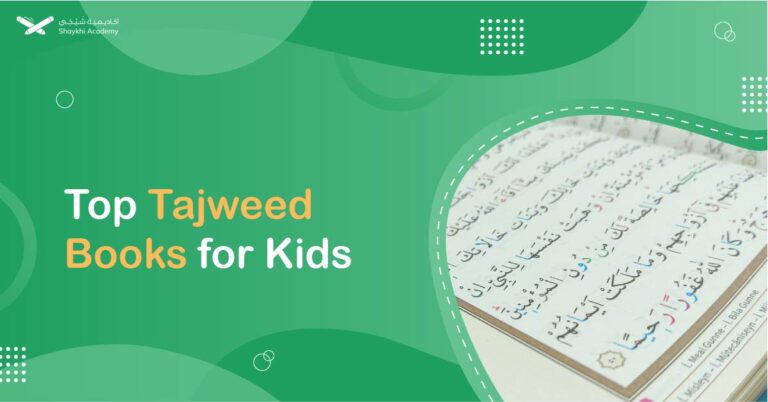Here are the top Ramadan Facts for Kids. Teaching kids about Ramadan holds immense value, offering them a window into the rich tapestry of Islamic faith and culture. Ramadan, the holiest month in Islam, presents a unique opportunity to instill in children important values such as empathy, compassion, gratitude, and self-discipline.
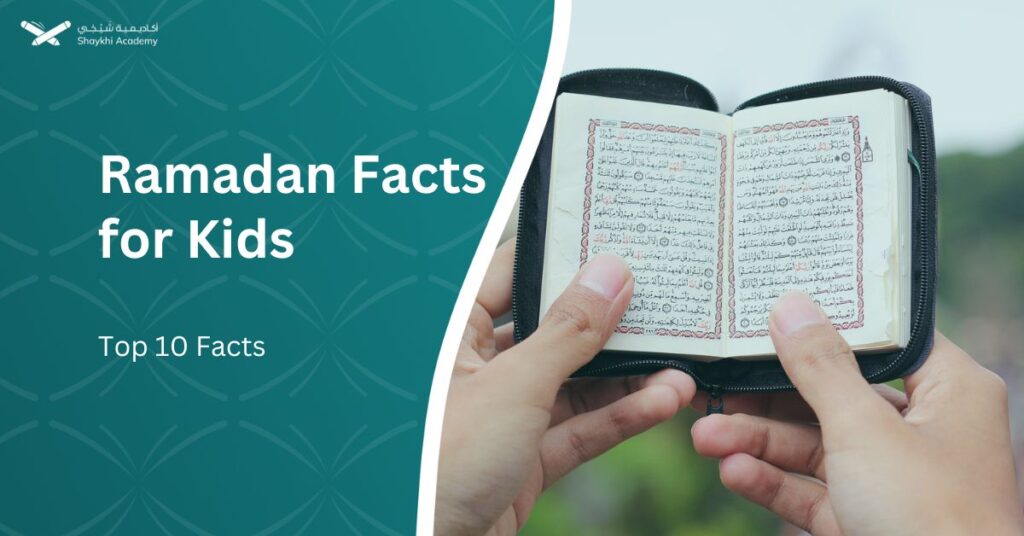
Ramadan Facts for Kids:
Ramadan is a special time for Muslims, rich with religious and cultural practices. Teaching children about Ramadan introduces them to important values like empathy, self-discipline, and gratitude. It fosters respect for diverse cultures and traditions within Islam while instilling life lessons about empathy, charity, and unity.
Due to the importance of getting kids to learn about Ramadan, several Quran courses for kids; such as the Quran Hifz courses for kids at Shaykhi Academy, make sure to explain all the Ramadan related concepts to their students.
1- Ramadan is a Holy Month:
Ramadan is a deeply significant month for Muslims around the globe. It occurs during the ninth month of the Islamic lunar calendar. During this time, Muslims believe that the gates of heaven are open, and Allah’s mercy and blessings are abundantly available.
Ramadan holds immense spiritual importance as it commemorates the revelation of the Quran, the holy book of Islam, to Prophet Muhammad. Throughout the month, Muslims engage in acts of worship, reflection, and self-improvement.
2- Teach Kids About Fasting:
Fasting is a central aspect of Ramadan. From dawn until sunset, Muslims abstain from food, drink, smoking, and other physical needs. The fast is not only a practice of self-discipline but also a means of drawing closer to Allah.
By refraining from worldly pleasures during daylight hours, Muslims focus their attention on spiritual matters, such as prayer, reading the Quran, and acts of charity.
Also read a full guide on: Ramadan Rules for Kids: Age, Eating, Fasting, Drinking, and More.
3- Teach Kids About Charity:
Giving to those in need is a fundamental aspect of Ramadan. Muslims are encouraged to be charitable and compassionate, particularly during this blessed month. Many Muslims choose to donate to charitable causes, support local initiatives, or participate in community service projects.
The act of giving is considered a form of worship, demonstrating gratitude for the blessings bestowed upon individuals. Ramadan serves as a reminder of the importance of helping those less fortunate, fostering empathy and compassion towards others in need.
4- Get Kids Used To Reciting the Quran:
The Quran holds a central position in Ramadan, as it was during this month that the first verses of the Quran were revealed to Prophet Muhammad. Muslims place a special emphasis on reading, reciting, and reflecting upon the Quran during Ramadan.
Many strive to complete the recitation of the entire Quran over the course of the month, dividing it into daily portions for study and contemplation. Quran tutors try to get even children to recite QUran extensively during Ramadan, and many recitation courses; such as Shaykhi Academy’s Quran recitation courses for kids; in which tutors and kids recite and study the verses of the Quran.
5- Teach Kids about Laylat al-Qadr:
Laylat al-Qadr is one of the holiest nights in Islam. It occurs during the last ten days of Ramadan and commemorates the night when the first verses of the Quran were revealed to Prophet Muhammad.
Muslims believe that Laylat al-Qadr holds immense spiritual significance, surpassing a thousand months in blessings and rewards. It is a night of intense worship, supplication, and devotion, as Muslims seek Allah’s mercy, forgiveness, and guidance.
6- Prayer in Ramadan:
Prayer plays a central role in Ramadan, with Muslims increasing their acts of worship and devotion throughout the month. In addition to the five daily prayers, Muslims perform special prayers known as Taraweeh during the nights of Ramadan.
These prayers are held in congregation at mosques and consist of lengthy recitations from the Quran. Taraweeh prayers offer Muslims the opportunity to seek spiritual rejuvenation, draw closer to Allah, and seek forgiveness for their sins.
7- Spiritual Growth:
Ramadan is a time of spiritual reflection and growth for Muslims. It provides an opportunity to strengthen one’s relationship with Allah through increased devotion and worship. Muslims dedicate more time to reading and studying the Quran, seeking guidance and wisdom from its teachings.
The month encourages self-reflection, repentance, and seeking forgiveness for past mistakes. Muslims strive to improve themselves morally and spiritually, aiming to become better individuals in the eyes of Allah.
8- Community:
Ramadan fosters a strong sense of community among Muslims. Families and friends come together to observe the fast, share meals, and engage in acts of worship.
The pre-dawn meal, known as Suhoor, is often enjoyed in the company of loved ones, providing a sense of camaraderie and support. Similarly, the evening meal to break the fast, called Iftar, is a communal affair where Muslims gather to break bread and offer prayers together.
9- How Ramadan Teaches Us Self-Discipline:
Ramadan teaches Muslims the importance of self-discipline, self-control, and moderation in all aspects of life. Fasting during Ramadan requires individuals to abstain from food, drink, and other worldly pleasures from dawn until sunset. This act of self-denial cultivates a sense of discipline, willpower, and resilience.
Muslims also strive to exercise self-discipline in their behavior, speech, and interactions with others. Ramadan serves as a time for reflection, introspection, and self-improvement, as individuals seek to overcome their weaknesses and cultivate positive habits.
10- How to Celebrate Ramadan:
Eid al-Fitr marks the end of Ramadan and is a joyous occasion for Muslims worldwide. It is a day of celebration, thanksgiving, and spiritual renewal. Muslims gather with family and friends to attend special prayers, exchange greetings, and partake in festive meals.
Eid al-Fitr is a time of happiness, generosity, and gratitude as Muslims reflect on the blessings of Ramadan and express their appreciation for Allah’s mercy and guidance. It is also a time for charity and compassion, as Muslims reach out to those in need and share their blessings with others.
What is Ramadan for Kids?
For kids, Ramadan is a time of excitement, learning, and togetherness. It’s a month filled with special traditions and activities that make it unique and memorable.
During Ramadan, kids see their families come together for pre-dawn meals (Suhoor) and evening feasts (Iftar), creating a sense of unity and bonding. They learn about the importance of fasting, not just from food and drink, but also from negative behaviors and actions.
Ramadan teaches kids the value of self-discipline, empathy for others, and gratitude for the blessings in their lives. They participate in acts of charity, such as donating food or helping those in need, which further instills a sense of compassion and generosity.
Through stories, prayers, and family rituals, kids gain a deeper understanding of their faith and its teachings, making Ramadan a meaningful and enriching experience for them.
How to Teach Kids about Ramadan?
Teaching kids about Ramadan requires patience, creativity, and a willingness to engage with them in meaningful ways. This process can be both educational and enjoyable. Here are some suggestions on how to do it effectively:
1- Start with the Basics:
Begin by explaining what Ramadan is, its significance in Islam, and why Muslims observe it. Keep the explanations simple and age-appropriate.
2- Use Visual Aids:
Utilize visual aids such as books, videos, and pictures to help kids understand the concepts of fasting, prayer, and charity in Ramadan. There are many resources available specifically designed for children to learn about Ramadan in a fun and engaging way.
3- Interactive Activities:
Plan interactive activities related to Ramadan, such as crafting Ramadan decorations, making traditional foods, or creating Ramadan-themed artwork. This hands-on approach allows kids to actively participate and learn while having fun.
4- Read Stories:
Share stories and anecdotes about Ramadan with your kids. Choose stories that illustrate the values of kindness, generosity, and empathy, which are central to the spirit of Ramadan. There are many children’s books available that feature Ramadan themes and characters.
5- Involve Them in Traditions:
Involve kids in family traditions associated with Ramadan, such as preparing Iftar meals, attending Taraweeh prayers at the mosque, or participating in acts of charity. This helps them feel connected to the observance of Ramadan and fosters a sense of belonging within the family and community.
6- Answer Questions:
Encourage kids to ask questions about Ramadan, and be prepared to provide simple and honest answers. Use their curiosity as an opportunity to engage in meaningful discussions about faith, culture, and diversity.
7- Lead by Example:
Set a positive example by observing Ramadan rituals yourself. Kids learn best by watching and imitating adults, so your actions and attitudes toward Ramadan will influence their understanding and appreciation of the holy month.
8- Encourage Reflection:
Encourage kids to reflect on their experiences during Ramadan, such as how they felt while fasting, what they learned, and how they can apply the values of Ramadan in their daily lives. This promotes self-awareness and personal growth.
9- Online Educational Courses:
Look for online educational courses or workshops designed specifically for kids to learn about Islamic matters like Ramadan. Shaykhi Academy’s Quran courses for kids usually include and embed Ramadan in their topics courses, which often include interactive lessons, videos, quizzes, and activities tailored to children’s learning needs and interests.
10- Virtual Mosque Tours:
Take advantage of virtual mosque tours offered by some Islamic organizations. These virtual tours allow kids to explore different aspects of mosque architecture, Islamic art, and cultural traditions associated with Ramadan from the comfort of their homes.
11- Guest Speakers:
Invite guest speakers, such as local imams or community leaders, to talk to kids about Ramadan. Hearing from knowledgeable individuals can provide valuable insights and perspectives on the significance of Ramadan and its practices.
12- Ramadan-themed Games:
Incorporate Ramadan-themed games and activities into learning sessions. Create word searches, crossword puzzles, or memory games featuring vocabulary related to Ramadan. You can also organize scavenger hunts or role-playing activities to make learning fun and interactive.
13- Art and Craft Projects:
Engage kids in art and craft projects inspired by Ramadan. Encourage them to create Ramadan decorations, greeting cards, or lanterns using various materials like paper, cardboard, and paint. These creative projects allow kids to express themselves while learning about Ramadan traditions.
14- Cooking Classes:
Organize cooking classes or demonstrations where kids can learn to prepare traditional Ramadan dishes. Teach them simple recipes for Iftar meals, desserts, or snacks commonly enjoyed during Ramadan. Cooking together provides a hands-on learning experience and helps kids appreciate the cultural significance of food in Ramadan.
15- Community Service Projects:
Get involved in community service projects with kids during Ramadan. Volunteer at local food banks, homeless shelters, or charity organizations to help those in need. Engaging in acts of kindness and service fosters empathy and compassion in children, reinforcing the importance of giving back to the community.
Ready to set your kid on an enriching journey into the world of the Quran with Shaykhi Academy?
Our Quran courses for kids offer a unique blend of spiritual learning and cultural appreciation, including comprehensive lessons on Ramadan.
With our flexible scheduling and personalized approach, we tailor each course to suit the needs and pace of every child. Join us today and empower your child to deepen their understanding of the Quran while embracing the values of compassion, empathy, and gratitude.
Enroll now at Shaykhi Academy and let your child discover the beauty of the Quran like never before!
Overall, educating kids about Ramadan not only enriches their knowledge and appreciation of Islamic traditions but also nurtures essential life skills and values that contribute to their personal growth and development.
